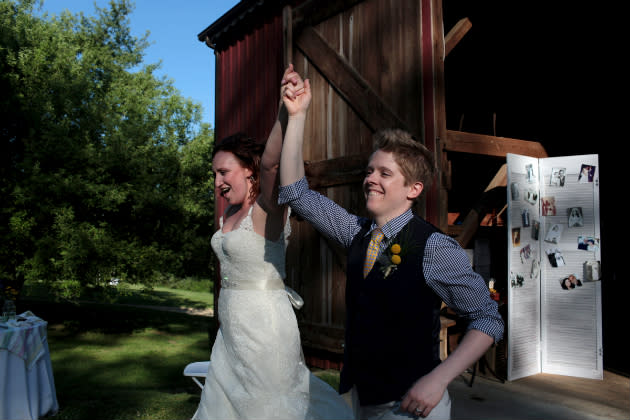 The Lookout
The LookoutA same-sex wedding, in the shadow of a Supreme Court ruling

Angie Jack and Emma Bedford wanted a traditional June wedding. But by simply desiring to enter into the age-old institution, they couldn't avoid making a political statement—even if they wanted to.
Emma, 26, considered reading part of Supreme Court Chief Justice Earl Warren's opinion from "Loving vs. Virginia," the landmark 1967 decision that invalidated laws prohibiting interracial marriage:
The freedom to marry has long been recognized as one of the vital personal rights essential to the orderly pursuit of happiness by free men. Marriage is one of the "basic civil rights of man," fundamental to our very existence and survival.
"I guess I'm more politically aware, and I'm not afraid to offend," Emma, a counselor for Bottom Line, a New York City-based nonprofit that helps mentor at-risk urban college students, says. "Now is the time to open the gates, to get on the right side of history."
But the couple ultimately decided to keep the debate surrounding same-sex marriage out of their June 1 ceremony, held at a rustic farm in Holmdel, N.J., in front of 120 friends and family members—and even a few pets—on an uncharacteristically hot spring day.
"I felt like it wasn't the right place," Angie, 31, says. "The people there didn't need to hear that message—they already support it."
Yet with the Supreme Court expected to deliver its opinions on a pair of pivotal gay marriage cases later this month—one challenging California's Proposition 8, a voter-approved ban on gay marriage, the other the Defense of Marriage Act (DOMA), which bars the U.S. government from recognizing same-sex marriages, even in states that allow them—the politics were hard to ignore.
"There was this political backdrop," Emma says. "The personal becomes political. It's strange."
The pair, who met in November 2010 on OKCupid.com, and who live in Brooklyn, were legally wed at New York's City Hall the day before their celebration in New Jersey—a state that doesn't recognize same sex marriage. (New Jersey was chosen as a central location for the couple's relatives; Emma is from Connecticut, Angie from Pittsburgh).
Angie, who works for the New York City Department of Education, was active in campaigning to get same-sex marriage legalized in New York, working with Empire State Pride doing "typical phone-banking," she says. When it passed, in June 2011, she and Emma briefly contemplated a shotgun wedding.
"There were like 5 minutes there where we were like, 'Should we get married? We should get married,'" Angie says. But because they'd only been dating a few months, she adds, "We were like, 'That's not a good idea. Let's wait.'"
Similarly, the June 1 date was chosen because it was practical, and not because it was before June 3, the first of four Mondays the court could have released its decision in either of the landmark cases. (The justices didn’t hand down either opinion then, and legal experts expect they could come closer to the end of the month.)
"We both work in education, so that time of year it's not as crazy," Angie says. "It was important to me that we were ready to get married, and not for any political pressure or impact. We're still just a couple."
That was evident in Holmdel, where the atmosphere was relaxed. Wine, beer and bourbon (Angie's drink of choice) were served. Hannah & Maggie, a band from Smith College, where Emma went, performed. Children played in the grass. Oliver, Emma's dog who accompanied her on the couple's first date, was the ring bearer. Rabbi Ron Herrmann, a longtime friend of Emma's family, presided over the otherwise traditional Jewish ceremony, agreeing to marry the couple on a Saturday—the Sabbath, and a time for rest—before sundown.
The support for gay marriage has been mounting. According to a recent NBC News/Wall Street Journal poll, a majority of Americans—53 percent—believe same sex couples should be able to marry. And a USC/Los Angeles Times poll released this week found 58 percent of the state's registered voters believe same-sex marriage should be legal.
Still, as Angie and Emma packed for their honeymoon—a trip to Rome followed by a Mediterranean cruise—the uncertainty surrounding the Supreme Court decisions loom.
Angie's boss, a woman, "has been married three times to the same woman because the laws have changed," Angie says. "I'm like, 'Are we going to have to go through this?'"
"There is still a tinge of frustration and angst," Emma says. "Everyone is waiting."



